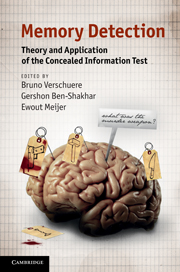Book contents
- Frontmatter
- Contents
- List of figures
- List of tables
- Notes on contributors
- Acknowledgments
- Part I Introduction
- Part II The laboratory: theoretical and empirical foundations of the Concealed Information Test
- Part III Field applications of concealed information detection: promises and perils
- 8 Limitations of the Concealed Information Test in criminal cases
- 9 Validity of the Concealed Information Test in realistic contexts
- 10 Leakage of information to innocent suspects
- 11 Countermeasures
- 12 Psychopathy and the detection of concealed information
- 13 Clinical applications of the Concealed Information Test
- 14 Daily application of the Concealed Information Test: Japan
- 15 The Concealed Information Test in the courtroom: legal aspects
- Part IV Conclusions
- Index
- References
11 - Countermeasures
Published online by Cambridge University Press: 05 June 2012
- Frontmatter
- Contents
- List of figures
- List of tables
- Notes on contributors
- Acknowledgments
- Part I Introduction
- Part II The laboratory: theoretical and empirical foundations of the Concealed Information Test
- Part III Field applications of concealed information detection: promises and perils
- 8 Limitations of the Concealed Information Test in criminal cases
- 9 Validity of the Concealed Information Test in realistic contexts
- 10 Leakage of information to innocent suspects
- 11 Countermeasures
- 12 Psychopathy and the detection of concealed information
- 13 Clinical applications of the Concealed Information Test
- 14 Daily application of the Concealed Information Test: Japan
- 15 The Concealed Information Test in the courtroom: legal aspects
- Part IV Conclusions
- Index
- References
Summary
Overview: Countermeasure manipulations performed by guilty suspects pose a major threat to all methods of psychophysiological detection, including the Concealed Information Test (CIT). The present chapter reviews the experimental literature dealing with the effects of various types of countermeasures (physical and mental) on the outcomes of both the Comparison Questions Test (CQT) and the CIT. Most of the studies reviewed demonstrated that it is possible and in fact quite easy to train subjects to produce or enhance their physiological responses to the neutral items in the CIT and the comparison questions in the CQT, and consequently distort the test's outcome. The studies reviewed focused on the effects of both physical and mental countermeasures on various autonomic measures as well as on ERPs. Finally, several means to protect the CIT against the use of countermeasures are raised and discussed.
Introduction
As indicated in previous chapters of this volume as well as in numerous articles, the CIT has great many advantages as a scientifically based method of detecting involvement in criminal or illegal activities (e.g., Ben-Shakhar and Elaad, 2002; 2003; Ben-Shakhar et al., 2002). On the other hand, the CIT is by no means free of obstacles and problems.
One of the most serious deficiencies of the CIT is its vulnerability to the use of countermeasures by guilty or deceptive examinees. Countermeasures are deliberate techniques that might be used by suspects to alter their physiological reactions.
Information
- Type
- Chapter
- Information
- Memory DetectionTheory and Application of the Concealed Information Test, pp. 200 - 214Publisher: Cambridge University PressPrint publication year: 2011
References
Accessibility standard: Unknown
Why this information is here
This section outlines the accessibility features of this content - including support for screen readers, full keyboard navigation and high-contrast display options. This may not be relevant for you.Accessibility Information
- 12
- Cited by
